Delphi Complete Works of Nathaniel Hawthorne (Illustrated) (395 page)
Read Delphi Complete Works of Nathaniel Hawthorne (Illustrated) Online
Authors: NATHANIEL HAWTHORNE

“Dear maiden,” said he, “thou wilt surely go with us. Thou art too gentle and sweet a child for such an iron-hearted father as King Minos. He cares no more for thee than a granite rock cares for the little flower that grows in one of its crevices. But my father, King Ægeus, and my mother, Æthra, and all the fathers and mothers in Athens, and all the sons and daughters too, will love and honor thee as their benefactress. Come with us, then; for King Minos will be very angry when he knows what thou hast done.”
Now, some low-minded people, who pretend to tell the story of Theseus and Ariadne, have the face to say that this royal and honorable maiden did really flee away, under cover of the night, with the young stranger whose life she had preserved. They say, too, that Prince Theseus (who would have died sooner than wrong the meanest creature in the world) ungratefully deserted Ariadne, on a solitary island, where the vessel touched on its voyage to Athens. But, had the noble Theseus heard these falsehoods, he would have served their slanderous authors as he served the Minotaur! Here is what Ariadne answered, when the brave prince of Athens besought her to accompany him: —
“No, Theseus,” the maiden said, pressing his hand, and then drawing back a step or two, “I cannot go with you. My father is old, and has nobody but myself to love him. Hard as you think his heart is, it would break to lose me. At first, King Minos will be angry; but he will soon forgive his only child; and, by and by, he will rejoice, I know, that no more youths and maidens must come from Athens to be devoured by the Minotaur. I have saved you, Theseus, as much for my father's sake as for your own. Farewell! Heaven bless you!”
All this was so true, and so maiden-like, and was spoken with so sweet a dignity, that Theseus would have blushed to urge her any longer. Nothing remained for him, therefore, but to bid Ariadne an affectionate farewell, and to go on board the vessel, and set sail.
In a few moments the white foam was boiling up before their prow, as Prince Theseus and his companions sailed out of the harbor, with a whistling breeze behind them. Talus, the brazen giant, on his never-ceasing sentinel's march, happened to be approaching that part of the coast; and they saw him, by the glimmering of the moonbeams on his polished surface, while he was yet a great way off. As the figure moved like clockwork, however, and could neither hasten his enormous strides nor retard them, he arrived at the port when they were just beyond the reach of his club. Nevertheless, straddling from headland to headland, as his custom was, Talus attempted to strike a blow at the vessel, and, overreaching himself, tumbled full length into the sea, which splashed high over his gigantic shape, as when an iceberg turns a somerset. There he lies yet; and whoever desires to enrich himself by means of brass had better go thither with a diving bell, and fish up Talus.
On the homeward voyage, the fourteen youths and damsels were in excellent spirits, as you will easily suppose. They spent most of their time in dancing, unless when the sidelong breeze made the deck slope too much. In due season, they came within sight of the coast of Attica, which was their native country. But here, I am grieved to tell you, happened a sad misfortune.
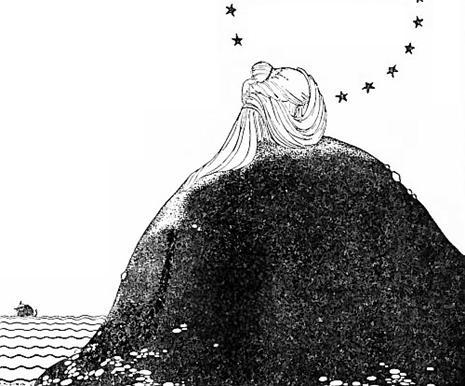
He concluded that his dear son had been eaten by the Minotaur.
You will remember (what Theseus unfortunately forgot) that his father, King Ægeus, had enjoined upon him to hoist sunshiny sails, instead of black ones, in case he should overcome the Minotaur, and return victorious. In the joy of their success, however, and amidst the sports, dancing, and other merriment, with which these young folks wore away the time, they never once thought whether their sails were black, white, or rainbow colored, and, indeed, left it entirely to the mariners whether they had any sails at all. Thus the vessel returned, like a raven, with the same sable wings that had wafted her away. But poor King Ægeus, day after day, infirm as he was, had clambered to the summit of a cliff that overhung the sea, and there sat watching for Prince Theseus, homeward bound; and no sooner did he behold the fatal blackness of the sails, than he concluded that his dear son, whom he loved so much, and felt so proud of, had been eaten by the Minotaur. He could not bear the thought of living any longer; so, first flinging his crown and scepter into the sea, (useless baubles that they were to him now!) King Ægeus merely stooped forward, and fell headlong over the cliff, and was drowned, poor soul, in the waves that foamed at its base!
This was melancholy news for Prince Theseus, who, when he stepped ashore, found himself king of all the country, whether he would or no; and such a turn of fortune was enough to make any young man feel very much out of spirits. However, he sent for his dear mother to Athens, and, by taking her advice in matters of state, became a very excellent monarch, and was greatly beloved by his people.
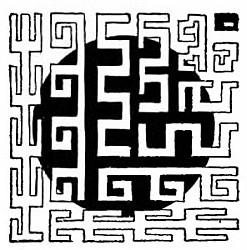
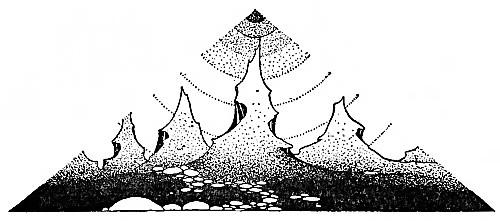
A Great while ago, when the world was full of wonders, there lived an earth-born Giant, named Antæus, and a million or more of curious little earth-born people, who were called Pygmies. This Giant and these Pygmies being children of the same mother, (that is to say, our good old Grandmother Earth,) were all brethren, and dwelt together in a very friendly and affectionate manner, far, far off, in the middle of hot Africa. The Pygmies were so small, and there were so many sandy deserts and such high mountains between them and the rest of mankind, that nobody could get a peep at them oftener than once in a hundred years. As for the Giant, being of a very lofty stature, it was easy enough to see him, but safest to keep out of his sight.
Among the Pygmies, I suppose, if one of them grew to the height of six or eight inches, he was reckoned a prodigiously tall man. It must have been very pretty to behold their little cities, with streets two or three feet wide, paved with the smallest pebbles, and bordered by habitations about as big as a squirrel's cage. The king's palace attained to the stupendous magnitude of Periwinkle's baby house, and stood in the center of a spacious square, which could hardly have been covered by our hearth rug. Their principal temple, or cathedral, was as lofty as yonder bureau, and was looked upon as a wonderfully sublime and magnificent edifice. All these structures were built neither of stone nor wood. They were neatly plastered together by the Pygmy workmen, pretty much like birds' nests, out of straw, feathers, egg shells, and other small bits of stuff, with stiff clay instead of mortar; and when the hot sun had dried them, they were just as snug and comfortable as a Pygmy could desire.
The country round about was conveniently laid out in fields, the largest of which was nearly of the same extent as one of Sweet Fern's flower beds. Here the Pygmies used to plant wheat and other kinds of grain, which, when it grew up and ripened, overshadowed these tiny people, as the pines, and the oaks, and the walnut and chestnut trees overshadow you and me, when we walk in our own tracts of woodland. At harvest time, they were forced to go with their little axes and cut down the grain, exactly as a woodcutter makes a clearing in the forest; and when a stalk of wheat, with its overburdened top, chanced to come crashing down upon an unfortunate Pygmy, it was apt to be a very sad affair. If it did not smash him all to pieces, at least, I am sure, it must have made the poor little fellow's head ache. And O, my stars! if the fathers and mothers were so small, what must the children and babies have been? A whole family of them might have been put to bed in a shoe, or have crept into an old glove, and played hide and seek in its thumb and fingers. You might have hidden a year-old baby under a thimble.
Now these funny Pygmies, as I told you before, had a Giant for their neighbor and brother, who was bigger, if possible, than they were little. He was so very tall that he carried a pine tree, which was eight feet through the butt, for a walking stick. It took a far-sighted Pygmy, I can assure you, to discern his summit without the help of a telescope; and sometimes, in misty weather, they could not see his upper half, but only his long legs, which seemed to be striding about by themselves. But at noonday, in a clear atmosphere, when the sun shone brightly over him, the Giant Antæus presented a very grand spectacle. There he used to stand, a perfect mountain of a man, with his great countenance smiling down upon his little brothers, and his one vast eye (which was as big as a cart wheel, and placed right in the center of his forehead) giving a friendly wink to the whole nation at once.
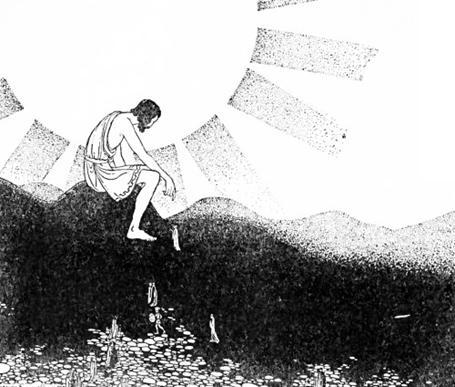 This giant and these pygmies were all brethren.
This giant and these pygmies were all brethren.
The Pygmies loved to talk with Antæus; and fifty times a day, one or another of them would turn up his head, and shout through the hollow of his fists, “Halloo, brother Antæus! How are you, my good fellow?” And when the small, distant squeak of their voices reached his ear, the Giant would make answer, “Pretty well, brother Pygmy, I thank you,” in a thunderous roar that would have shaken down the walls of their strongest temple, only that it came from so far aloft.
It was a happy circumstance that Antæus was the Pygmy people's friend; for there was more strength in his little finger than in ten million of such bodies as theirs. If he had been as ill-natured to them as he was to everybody else, he might have beaten down their biggest city at one kick, and hardly have known that he did it. With the tornado of his breath, he could have stripped the roofs from a hundred dwellings, and sent thousands of the inhabitants whirling through the air. He might have set his immense foot upon a multitude; and when he took it up again, there would have been a pitiful sight, to be sure. But, being the son of Mother Earth, as they likewise were, the Giant gave them his brotherly kindness, and loved them with as big a love as it was possible to feel for creatures so very small. And, on their parts, the Pygmies loved Antæus with as much affection as their tiny hearts could hold. He was always ready to do them any good offices that lay in his power; as for example, when they wanted a breeze to turn their wind mills, the Giant would set all the sails a-going with the mere natural respiration of his lungs. When the sun was too hot, he often sat himself down, and let his shadow fall over the kingdom, from one frontier to the other; and as for matters in general, he was wise enough to let them alone, and leave the Pygmies to manage their own affairs — which, after all, is about the best thing that great people can do for little ones.
In short, as I said before, Antæus loved the Pygmies, and the Pygmies loved Antæus. The Giant's life being as long as his body was large, while the lifetime of a Pygmy was but a span, this friendly intercourse had been going on for innumerable generations and ages. It was written about in the Pygmy histories, and talked about in their ancient traditions. The most venerable and white-bearded Pygmy had never heard of a time even, in his greatest of grandfather's days, when the Giant was not their enormous friend. Once, to be sure, (as was recorded on an obelisk, three feet high, erected on the place of the catastrophe,) Antæus sat down upon about five thousand Pygmies who were assembled at a military review. But this was one of those unlucky accidents for which nobody is to blame; so that the small folks never took it to heart and only requested the Giant to be careful forever afterwards to examine the acre of ground where he intended to squat himself.
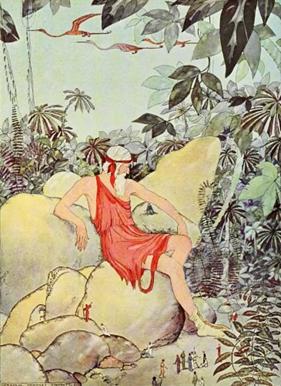
The giant gave them his brotherly kindness
It is a very pleasant picture to imagine Antæus standing among the Pygmies, like the spire of the tallest cathedral that ever was built, while they ran about like pismires at his feet, and to think that, in spite of their difference in size, there were affection and sympathy between them and him! Indeed, it has always seemed to me that the Giant needed the little people more than the Pygmies needed the Giant. For, unless they had been his neighbors and well wishers, and, as we may say, his playfellows, Antæus would not have had a single friend in the world. No other being like himself had ever been created. No creature of his own size had ever talked with him, in thunder-like accents, face to face. When he stood with his head among the clouds, he was quite alone, and had been so for hundreds of years, and would be so forever. Even if he had met another Giant, Antæus would have fancied the world not big enough for two such vast personages, and, instead of being friends with him, would have fought him till one of the two was killed. But with the Pygmies he was the most sportive, and humorous, and merry-hearted, and sweet-tempered old Giant that ever washed his face in a wet cloud.
His little friends, like all other small people, had a great opinion of their own importance, and used to assume quite a patronizing air towards the giant.
“Poor creature!” they said one to another. “He has a very dull time of it, all by himself; and we ought not to grudge wasting a little of our precious time to amuse him. He is not half so bright as we are, to be sure; and, for that reason, he needs us to look after his comfort and happiness. Let us be kind to the old fellow. Why, if Mother Earth had not been very kind to ourselves, we might all have been Giants too.”
On all their holidays, the Pygmies had excellent sport with Antæus. He often stretched himself out at full length on the ground, where he looked like the long ridge of a hill; and it was a good hour's walk, no doubt, for a short-legged Pygmy to journey from head to foot of the Giant. He would lay down his great hand flat on the grass, and challenge the tallest of them to clamber upon it, and straddle from finger to finger. So fearless were they, that they made nothing of creeping in among the folds of his garments. When his head lay sidewise on the earth, they would march boldly up, and peep into the great cavern of his mouth, and take it all as a joke (as indeed it was meant) when Antæus gave a sudden snap with his jaws, as if he were going to swallow fifty of them at once. You would have laughed to see the children dodging in and out among his hair, or swinging from his beard. It is impossible to tell half of the funny tricks that they played with their huge comrade; but I do not know that anything was more curious than when a party of boys were seen running races on his forehead, to try which of them could get first round the circle of his one great eye. It was another favorite feat with them to march along the bridge of his nose, and jump down upon his upper lip.
If the truth must be told, they were sometimes as troublesome to the Giant as a swarm of ants or mosquitoes, especially as they had a fondness for mischief, and liked to prick his skin with their little swords and lances, to see how thick and tough it was. But Antæus took it all kindly enough; although, once in a while, when he happened to be sleepy, he would grumble out a peevish word or two, like the muttering of a tempest, and ask them to have done with their nonsense. A great deal oftener, however, he watched their merriment and gambols until his huge, heavy, clumsy wits were completely stirred up by them; and then would he roar out such a tremendous volume of immeasurable laughter, that the whole nation of Pygmies had to put their hands to their ears, else it would certainly have deafened them.
“Ho! ho! ho!” quoth the Giant, shaking his mountainous sides. “What a funny thing it is to be little! If I were not Antæus, I should like to be a Pygmy, just for the joke's sake.”
The Pygmies had but one thing to trouble them in the world. They were constantly at war with the cranes, and had always been so, ever since the long-lived Giant could remember. From time to time, very terrible battles had been fought, in which sometimes the little men won the victory, and sometimes the cranes. According to some historians, the Pygmies used to go to the battle, mounted on the backs of goats and rams; but such animals as these must have been far too big for Pygmies to ride upon; so that, I rather suppose, they rode on squirrelback, or rabbitback, or ratback, or perhaps got upon hedge-hogs, whose prickly quills would be very terrible to the enemy. However this might be, and whatever creatures the Pygmies rode upon, I do not doubt that they made a formidable appearance, armed with sword and spear, and bow and arrow, blowing their tiny trumpet, and shouting their little war cry. They never failed to exhort one another to fight bravely, and recollect that the world had its eyes upon them; although, in simple truth, the only spectator was the Giant Antæus, with his one, great, stupid eye, in the middle of his forehead.
